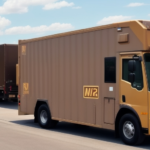How to Calculate FedEx Shipping Rates for Bulk Items
Are you a business owner or individual who needs to ship bulk items with FedEx? Understanding how FedEx calculates shipping rates can help you optimize your shipping costs and enhance your logistics strategy. This guide provides a comprehensive overview of calculating FedEx shipping rates for bulk items, including the factors influencing rates, choosing the right services, and implementing cost-saving strategies.
Understanding FedEx's Shipping Rate Calculation
Zone-Based Pricing and Distance
FedEx utilizes a zone-based pricing system, where shipping rates are determined by the distance between the origin and destination. The United States is divided into different shipping zones, and the farther the distance, the higher the shipping cost. Understanding these zones can help you estimate costs more accurately.
Weight and Dimensions
Shipping rates for bulk items are significantly influenced by the weight and dimensions of your packages. FedEx calculates the dimensional weight, which considers both size and weight, to determine the most cost-effective rate. Oversized or heavy items may incur additional surcharges.
Service Type
FedEx offers various service types, including FedEx Ground, FedEx Express Saver, and FedEx Overnight. Faster delivery services come at a premium cost, whereas ground services are more economical for non-urgent shipments.
Discounts and Volume Pricing
Businesses that ship in high volumes can qualify for discounted rates. FedEx provides volume pricing and other discounts for frequent shippers, making bulk shipping more affordable. It's beneficial to discuss available discounts with your FedEx account manager.
Factors Affecting Shipping Rates for Bulk Items
Package Size and Weight
Larger and heavier packages generally cost more to ship. FedEx’s pricing structure considers both actual weight and dimensional weight, charging whichever is greater. Efficient packaging can help minimize these costs.
Mode of Transportation
Choosing between air and ground transportation affects shipping costs. Air shipping is faster but more expensive, while ground shipping is cost-effective for bulky items that do not require expedited delivery.
Seasonal Demand
Peak seasons, such as the holidays, can lead to higher shipping rates due to increased demand. Planning your shipments ahead of peak periods can help avoid elevated costs.
Additional Fees and Surcharges
Extra fees may apply for services like residential deliveries, hazardous materials handling, or delivery to remote locations. Understanding these potential surcharges helps in accurate cost estimation.
Accurate Measurement and Packaging of Bulk Items
Measuring and Weighing Packages
Accurate measurements are crucial for determining shipping rates. Use a reliable scale to weigh your packages and measure the length, width, and height precisely. Always round up to the nearest inch or pound to avoid unexpected charges.
Packaging Materials and Techniques
Use sturdy packaging materials such as heavy-duty boxes or crates to protect bulk items during transit. Incorporate cushioning materials like bubble wrap or packing peanuts to prevent damage. Proper packaging not only safeguards your items but also complies with FedEx’s size and weight requirements.
Labeling and Compliance
Clearly label each package with the contents and handling instructions. Ensuring compliance with FedEx’s packaging guidelines can prevent delays and additional fees. For hazardous or special items, adhere to specific labeling and packaging standards as outlined by FedEx.
Choosing the Right FedEx Shipping Service
FedEx Ground vs. FedEx Express
FedEx Ground is ideal for cost-effective, non-urgent bulk shipments. It offers reliable delivery within 1-5 business days, depending on the distance. FedEx Express services provide faster delivery options, such as overnight or two-day shipping, suitable for time-sensitive bulk items.
Specialized Services: Freight and Custom Critical
For exceptionally large or high-value items, FedEx Freight offers less-than-truckload (LTL) and full truckload (FTL) options. FedEx Custom Critical provides expedited shipping solutions for urgent and high-priority bulk shipments requiring specialized handling.
Comparing Rates and Features
Evaluate the features and rates of different FedEx services to determine the best fit for your shipping needs. Consider factors like delivery speed, cost, reliability, and special handling requirements when making your decision.
Strategies to Save Money on FedEx Shipping Rates
Utilizing Volume Discounts
Enrolling in FedEx’s volume discount programs can lead to significant savings for businesses that ship frequently. These discounts are based on your shipping volume and can reduce the per-package cost.
Shipment Consolidation
Combining multiple shipments into a single bulk shipment can lower overall shipping costs. Consolidation reduces the number of individual packages, thereby decreasing handling fees and taking advantage of bulk rate discounts.
Negotiating Rates
Businesses with substantial shipping volumes can negotiate custom rates with FedEx. Present your shipping data and volume projections to secure more favorable rates and terms that align with your shipping needs.
Leveraging Third-Party Services
Third-party logistics providers can negotiate better rates with FedEx on your behalf. These services often have established relationships and bulk shipping agreements, providing additional cost savings and streamlined shipping processes.
Tracking and Managing Bulk Shipments
FedEx Tracking Tools
FedEx offers robust tracking tools, including online tracking portals, mobile apps, and email notifications. These tools provide real-time updates on your shipments’ status, helping you monitor delivery progress and address any issues promptly.
Delivery Options and Customizations
Customize your delivery options to suit your needs. FedEx allows you to specify delivery locations, set preferred delivery times, and arrange for secure drop-offs. These customizations ensure that bulk shipments are delivered according to your preferences and operational requirements.
Common Mistakes and How to Avoid Them
Incorrect Measurements
Inaccurate measurements can lead to incorrect shipping rates and unexpected fees. Always double-check your package dimensions and weight before shipping to ensure accuracy.
Selecting Inappropriate Services
Choosing the wrong shipping service can result in higher costs or delayed deliveries. Assess your shipment’s urgency, size, and destination carefully to select the most suitable FedEx service.
Poor Packaging
Improper packaging can cause damage to bulk items and incur additional fees for repackaging or special handling. Invest in high-quality packaging materials and techniques to protect your shipments and comply with FedEx’s standards.
Conclusion
Calculating FedEx shipping rates for bulk items involves understanding various factors, including weight, dimensions, service type, and additional fees. By accurately measuring and packaging your items, choosing the right shipping services, and implementing cost-saving strategies, you can optimize your shipping costs and enhance your business’s logistics efficiency. Stay informed about FedEx’s latest pricing structures and leverage available discounts to make the most of your bulk shipping operations.


















